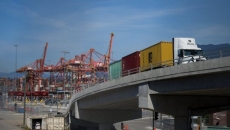Federal public servants warned the government two years ago that large increases to immigration could affect housing affordability and services, internal documents show.
Documents obtained by The Canadian Press through an access-to-information request show Immigration, Refugees and Citizenship Canada analyzed the potential effects immigration would have on the economy, housing and services, as it prepared its immigration targets for 2023 to 2025.
The deputy minister, among others, was warned in 2022 that housing construction had not kept up with the pace of population growth.
"In Canada, population growth has exceeded the growth in available housing units," one slide deck reads.
“As the federal authority charged with managing immigration, IRCC policy-makers must understand the misalignment between population growth and housing supply, and how permanent and temporary immigration shapes population growth."
Immigration accounts for nearly all population growth in Canada, given the country's aging demographics.
The federal government ultimately decided to increase the number of permanent residents Canada welcomes each year to 500,000 in 2025, a decision that drew considerable attention and scrutiny. It means in 2025, Canada will welcome nearly twice as many permanent residents as it did in 2015.
The document reveals federal public servants were well aware of the pressures high population growth would have on housing and services.
"Rapid increases put pressure on health care and affordable housing," public servants warned. "Settlement and resettlement service providers are expressing short-term strain due to labour market conditions, increased levels and the Afghanistan and Ukraine initiatives."
Housing affordability has now become a political liability for the Liberal government. The Conservatives have gained considerable momentum over the last year as the party pounces on affordability issues, while avoiding the issue of immigration in particular. These pressures have forced the Liberal government to refocus its efforts on housing policy and begin to address the spike in international students with new rules.
Recent data shows Canada’s pace of population growth continues to set records as the country brings in a historic number of temporary residents as well, largely through international student and temporary foreign worker programs.
The country’s population grew by more than 430,000 during the third quarter of 2023, marking the fastest pace of population growth in any quarter since 1957.
Experts spanning from Bay Street to academic institutions have warned that Canada's strong population growth is eroding housing affordability, as demand outpaces supply.
The Bank of Canada has offered similar analysis. Deputy governor Toni Gravelle delivered a speech in December warning that strong population growth is pushing rents and home prices upward.
Public opinion polls also show Canadians are increasingly concerned about the pressure immigration is putting on services, infrastructure and housing, leading to waning support for high immigration.
The Liberal government has defended its immigration policy decisions, arguing that immigrants help bring about economic prosperity and help with the country's demographics as the population ages.
However, amid the heightened scrutiny of the Liberal government's immigration policy, Immigration Minister Marc Miller levelled out the annual target at 500,000 permanent residents for 2026.
The documents from 2022 note that Canada's immigration targets have exceeded the recommendations of some experts, including the Century Initiative, an organization that advocates for growing the country's population to 100 million by the end of the century.
However, attention is now shifting from these targets to the steep rise in non-permanent residents. Between July and October, about three-quarters of Canada's population growth came from temporary residents, including international students and temporary foreign workers.
That trend is raising alarms about the increase in businesses' reliance on low-wage migrant workers and the luring of international student by shady post-secondary institutions.
Mikal Skuterud, an economics professor at the University of Waterloo who specializes in immigration policy, says the federal government appears to have "lost control" of temporary migration flows.
Unlike the annual targets for permanent residents, the number of temporary residents is dictated by demand for migrant workers and international students.
He also notes there is a link between the targets for permanent residents and the flow of temporary residents.
"To the extent that you increase permanent numbers, and migrants realize the way you get a PR is to come here as a temporary resident ... then migrants are incentivized to kind of come and try their luck," he said.
Skuterud, who has been a vocal critic of the federal government's immigration policy, says the benefits of high immigration have been exaggerated by the Liberals.
He said that starting around 2015, when the Liberal government was first elected, a narrative developed in Canada that "immigration was kind of a solution to Canada's economic growth problems."
And while the professor says that narrative is one that people like to believe, he notes higher immigration does little when it comes to increasing living standards, as measured by real GDP per capita.
Public servants at IRCC are in agreement, the released documents suggest.
"Increasing the working age population can have a positive impact on gross domestic product, but little effect on GDP per capita," public servants noted.






